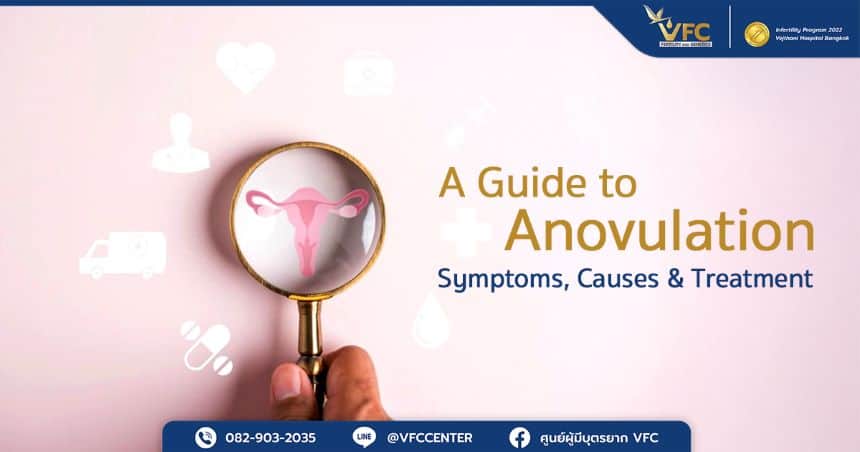
The journey towards parenthood can be an exhilarating time filled with anticipation and hope. However, it can also lead to questions and anxieties, especially if pregnancy doesn’t happen as quickly as expected. Anovulation is a condition where ovulation (the release of an egg from the ovary) doesn’t occur. Without ovulation, natural conception becomes very unlikely, and is a common cause of infertility.
Let’s discuss anovulation in detail, including its causes, symptoms, and treatment options at V Fertility Center, a trusted fertility clinic in Bangkok.
What Happens During Ovulation?
To understand anovulation, it helps to first understand how ovulation works. During a healthy menstrual cycle, the follicle-stimulating hormone (FSH) triggers the growth of follicles in the ovaries. These follicles contain immature eggs. As the follicles mature, they produce estrogen, another key hormone. The rising estrogen levels ultimately lead to a surge in the luteinizing hormone (LH). This LH surge triggers the release of a mature egg from the dominant follicle, which results in ovulation. When ovulation doesn’t happen, the entire reproductive process is interrupted.
What Causes Anovulation?
Several factors can disrupt the hormonal processes necessary for ovulation, which leads to anovulation. Here are some of the most common causes:
- Hormonal Imbalance: Conditions like Polycystic Ovary Syndrome (PCOS) are a leading cause of anovulation as they disrupt the delicate hormonal balance needed for ovulation.
- Prolactin Levels: Elevated prolactin, a hormone produced by the pituitary gland, or thyroid dysfunction, can suppress ovulation.
- Androgen Levels: High levels of androgens (male sex hormones) can interfere with follicle maturation, egg development, and ovulation.
- Pituitary Gland or Hypothalamic Dysfunction: The pituitary gland plays a crucial role in regulating hormones. Dysfunction of this gland can affect hormone production and impact ovulation.
Other factors that can affect hormone levels, which may contribute to anovulation, include:
- Extreme weight loss or excessive weight gain
- Chronic stress and chronic disease
- Excessive exercise
- Certain medications
What are the Signs And Symptoms of Anovulation?
Unfortunately, anovulation often doesn’t present with clear-cut or obvious symptoms. However, you may notice some signs, including:
- Irregular menstrual cycles: This can be a long or short cycle length, or even skipping periods altogether. A cycle shorter than 21 days or longer than 35 days could indicate a problem.
- No signs of ovulation: No mid-cycle cervical mucus changes or ovulation pain.
- Ovulation spotting: Some women experience spotting around the time ovulation typically occurs, but this can be misleading as it doesn’t guarantee actual ovulation.
- Basal Body Temperature (BBT) remains flat: While not foolproof, BBT charts may not show the typical temperature rise that occurs after ovulation.
- Unexplained infertility: Difficulty conceiving without any other identified cause.
If you’re concerned about anovulation, discuss your cycle with a healthcare professional.
Anovulation Risk Factors
Certain conditions or lifestyle factors can increase your risk of anovulation, such as:
- Age: Fertility declines with age, making anovulation more common as menopause approaches.
- Weight: Both underweight and overweight individuals are at higher risk, as excessive weight loss and obesity can disrupt ovulation.
- Family history: If you have a family history of PCOS, reproductive hormone disorders, or infertility, your risk may be higher.
- Underlying medical conditions: Conditions like thyroid disorders, insulin resistance, and diabetes can impact ovulation.
Reducing the Risk of Anovulation
While you can’t completely eliminate the risk of anovulation, some lifestyle changes can help support reproductive health:
- Maintain a healthy weight: A balanced and nutritious diet and regular exercise can contribute to hormonal production and balance.
- Manage stress: Chronic stress can disrupt your menstrual cycle. Relaxation techniques like yoga and meditation can be beneficial.
- Monitor menstrual patterns: Keep track of your cycle to help identify and address issues early.
- Talk to your doctor: Discuss any concerns about your cycle or risk factors with your doctor.
Diagnosis, Management, and Treatment of Anovulation
Understanding the root cause is important in finding the right treatment strategy. Diagnosing anovulation often involves a combination of tests like:
- Hormone testing: Blood tests for FSH, LH, estrogen, progesterone, prolactin, and thyroid hormones.
- Pelvic ultrasound imaging: To assess follicle development and ovarian structure.
- Ovulation predictor kits: These detect LH surges, but are less reliable in anovulatory cycles.
- Basal body temperature charting: Useful for tracking ovulatory patterns over time.
With proper diagnosis and targeted treatment, anovulation is often manageable. Treatment options will depend on the underlying cause. Some common treatment approaches for anovulation include:
- Lifestyle changes: For some women, maintaining a healthy weight, managing stress, or making dietary improvements can sometimes address anovulation. Avoiding overtraining or excessive exercise without proper caloric intake is also important.
- Medication: PCOS-related medications like Clomid and Letrozole can help stimulate ovulation by triggering the release of follicle-stimulating hormones (FSH).
- Surgery: For women with PCOS who don’t respond to medication, a minimally invasive laparoscopic surgery (ovarian drilling) may be needed to address issues.
- Assisted reproductive technologies (ART): If medications and lifestyle changes don’t restore ovulation, ART like In Vitro Fertilization (IVF) or Intrauterine Insemination (IUI) may be recommended.

Schedule An Appointment with V-Fertility Center
If you suspect you might have anovulation and are experiencing symptoms like irregular menstrual cycles, consider scheduling an appointment with V Fertility Center in Bangkok.
At V Fertility Center, we understand the unique challenges anovulation can present, particularly when it comes to fertility. Our team of experienced specialists can work with you to develop a personalized plan to address anovulation and other infertility issues. Our IVF clinic in Bangkok offers various treatment options, including IVF, and the latest technologies and assisted reproductive techniques.
As a JCI-accredited hospital, we also offer our international patients personalized support through our International Patient Advocates, ensuring a seamless experience from inquiry to post-treatment. Contact us for a consultation today.
V Fertility Center
Address: 3 Lat Phrao Road 111, Klong-Chan Bangkapi, Bangkok 10240
Hotline: 082-903-2035
LINE Official: @vfccenter

The team of specialists in obstetrics and gynecology and reproductive medicine





No Comments
Sorry, the comment form is closed at this time.